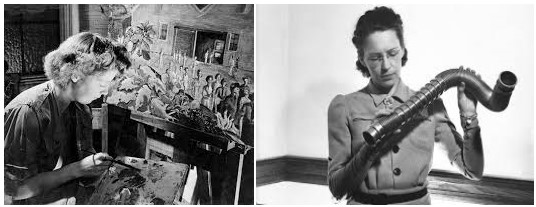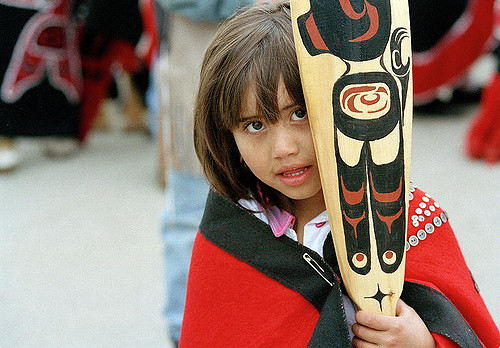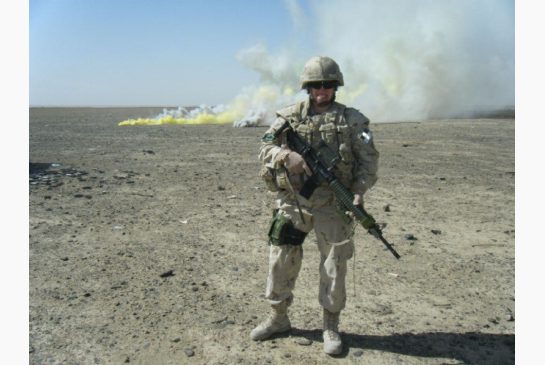This is a part one of a two-part article that gives a biography of some important Canadian women who were in WW2 as well as their life after the war.
Molly Bobak (née Lamb) was born in Vancouver, BC, and studied at the Vancouver School of Art from 1938 to 1941. Through the intervention of A.Y. Jackson and Harry McCurry she was appointed as official Canadian war artist in 1945, the only woman to receive such a distinction. She is the first woman to be named a Canadian war artist, preparing hundreds of sketches and paintings of war scenes and Canadian Women Army Corps personnel at work.
It was here that she met her husband, Bruno Bobak, also a Canadian war artist. Following the war and marriage, Molly Bobak returned to Vancouver where she taught at the Vancouver School of Art and began to work in radio and television for which she exhibited a particular aptitude. She then received a Canada Council Fellowship to study in Norway. Her time abroad was cut short when her husband was appointed as Artist-in-Residence at the University of New Brunswick (UNB) in Autumn 1960, which saw them relocate to Fredericton. During this time Molly continued to give workshops at UNB and across Canada and resumed her television work, offering live art lessons.
Through all of her work Molly received honorary degrees from UNB, Mount Allison University, and Saint Thomas University, and is a member of the Royal Canadian Academy of Arts. In 1995 she was made a member of the Order of Canada. She is remembered as being among the first generation of Canadian women artists to work professionally and earn a living from their art.
Elsie MacGill attended public school prior to enrolling in applied science at the University of British Columbia in 1921. After two years of study, she enrolled at the University of Toronto’s School of Practical Science in electrical engineering. This was a bold move, as she was the first woman admitted to the engineering program and, at times, her presence caused quite a stir among her male colleagues. MacGill graduated in 1927 and found employment as a mechanical engineer with an automobile company in Michigan. When the company started producing airplanes, she decided to learn more, first as a part-time student, then switching to full-time. In 1929, she successfully completed her master’s degree in aeronautical engineering at the University of Michigan. This was a ground-breaking step for women, as it effectively made her the first woman aeronautical engineer in the world. However, MacGill’s celebration was cut short when she was diagnosed with polio, forcing her to return home to Vancouver for her recovery.
Once recovered, she continued her postgraduate studies at the Massachusetts Institute of Technology (MIT) until 1934, when she was offered to work as an assistant aeronautical engineer doing cutting edge work at Fairchild Aircraft back in Canada. In 1938, two important professional developments occurred in MacGill’s life: she received an offer of employment as chief aeronautical engineer at Canadian Car & Foundry (Can Car) in Fort William, Ontario, and was accepted into the Engineering Institute of Canada, making her the first woman member of the professional association.
Upon her arrival at Can Car, MacGill undertook numerous projects, including the design, construction, and testing of the Maple Leaf II Trainer. While it was based on a previous model, MacGill completely re-engineered the plane at incredible speed, seeing the prototype through to aerial testing very early in her tenure at Can Car. While the plane never went into full production in Canada, it is recognized as the first aircraft designed and produced by a woman. After this achievement, MacGill oversaw the retooling of the plant so that it could mass-produce the Hawker Hurricane, one of the fighters flown in the Battle of Britain. This was a massive undertaking, and the media was quick to latch onto the fact that a woman was serving as Can Car’s chief aeronautical engineer during wartime. MacGill oversaw the production of 1,451 planes and designed a winterized version with skis and de-icing equipment. This project represented the first successful winterization of a high-speed aircraft. In 1940, her team’s design and production methods were turning out more than 100 Hurricane combat aircraft per month. Numerous articles were written about MacGill and in 1942, the American True Comics series ran a story about her in which they dubbed her the “Queen of the Hurricanes.”
After the Hawker Hurricane contract ended in 1943, MacGill once again oversaw the retooling of the plant, this time to produce the American Curtiss-Wright Helldiver. Nicknamed “The Beast,” this plane was especially difficult to work with on account of the numerous design changes sent from the United States. In the midst of these design challenges, MacGill and plant manager E.J. Soulsby were marched out of the plant in 1943. Soon after, they married and relocated to Toronto where MacGill founded a successful consulting engineering company. She also became a Canadian representative in the International Civil Aviation Organization and, before long, became the first woman to serve as a technical advisor on aircraft airworthiness.
Elsie MacGill was a trail-blazing engineer and prominent Canadian feminist. She rejected the label “woman engineer.” Her perspective was that she was an engineer, period — the fact that she was a woman did not need to be highlighted, as she had proven time and again that her sex in no way impacted her ability to do her job. MacGill’s rise in engineering had been relatively unchallenged and she was largely blind to any discrimination she experienced.
Over her years of service MacGill has received many honours degrees and awards. Most notable are Officer, Order of Canada (1971), Queen Elizabeth II Silver Jubilee Medal (1977) and being inducted into the Canadian Science and Engineering Hall of Fame (1992).
Featured Pictures: Molly Bobak via National Film Board of Canada / Library and Archives Canada / PA-188549. Elsie MacGill via USA Blog.
Disclaimer: Any views or opinions expressed in articles are solely those of the authors and do not necessarily represent the views of the NATO Association of Canada.




